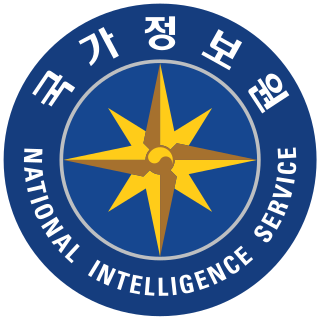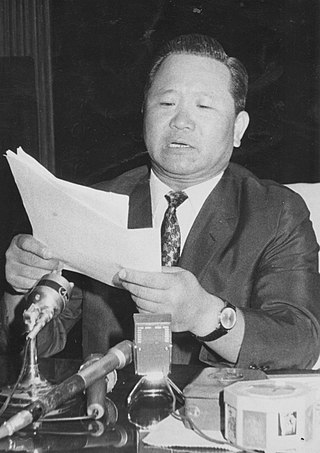Related Research Articles

Sun Myung Moon was a Korean religious leader, also known for his business ventures and support for conservative political causes. A messiah claimant, he was the founder of the Unification Church, and of its widely noted "Blessing" or mass wedding ceremonies, and the author of its unique theology the Divine Principle. He was an anti-communist and an advocate for Korean reunification, for which he was recognized by the governments of both North and South Korea. Businesses he promoted included News World Communications, an international news media corporation known for its American subsidiary The Washington Times, and Tongil Group, a South Korean business group (chaebol), as well as other related organizations.

Kim Dae-jung, often referred to by his initials DJ, was a South Korean politician and activist who served as the eighth president of South Korea from 1998 to 2003.
Bo Hi Pak was a prominent member of the Unification Church. During the 1970s and 1980s, he was a major leader in the church movement, leading projects such as newspapers, schools, performing arts projects, political projects such as the anti-communist organization CAUSA International, and was president of the Unification Church International 1977–1991. He was also the president of Little Angels Children's Folk Ballet of Korea.

Kim Jae-gyu was a South Korean politician, army lieutenant general and the director of the Korean Central Intelligence Agency. He assassinated South Korean President Park Chung-hee—who had been one of his closest friends—on October 26, 1979, and was subsequently executed by hanging on May 24, 1980.

The Family Federation for World Peace and Unification (FFWPU), widely known as the Unification Church, is a new religious movement derived from Christianity, whose members are called Unificationists or informally Moonies. Sun Myung Moon (1920–2012) started amassing followers after the Second World War ended and, on 1 May 1954 in Seoul, South Korea, officially founded the Holy Spirit Association for the Unification of World Christianity (HSA-UWC), the Unification Church's full name until 1994. It has a presence in approximately 100 countries around the world. Its leaders are Moon and his wife Hak Ja Han, whom their followers honor with the title "True Parents".

Kim Hyong-jik was a Korean independence activist during Japanese rule. He was the father of the North Korean founder Kim Il Sung, the paternal grandfather of Kim Jong Il, and a great-grandfather of the current leader of North Korea, Kim Jong Un.

The National Intelligence Service is the chief intelligence agency of South Korea. The agency was officially established in 1961 as the Korean Central Intelligence Agency, during the rule of President Park Chung-hee's military Supreme Council for National Reconstruction, which displaced the Second Republic of Korea. The original duties of the KCIA were to supervise and coordinate both international and domestic intelligence activities and criminal investigations by all government intelligence agencies, including that of the military. The agency's broad powers allowed it to actively intervene in politics. Agents undergo years of training and checks before they are officially inducted and receive their first assignments.

The Fourth Republic of Korea (Korean: 제4공화국) was the government of South Korea from November 1972 to March 1981.
"Koreagate" was an American political scandal in 1976 involving South Korean political figures seeking influence from 10 Democratic members of Congress. The scandal involved the uncovering of evidence that the Korea Central Intelligence Agency (KCIA) was allegedly funneling bribes and favors through Korean businessman Tongsun Park in an attempt to gain favor and influence in American politics. Reversing President Richard Nixon's decision to withdraw troops from South Korea is thought to have been one of their primary objectives.
Human rights in South Korea are codified in the Constitution of the Republic of Korea, which compiles the legal rights of its citizens. These rights are protected by the Constitution and include amendments and national referendum. These rights have evolved significantly from the days of military dictatorship to the current state as a constitutional democracy with free and fair elections for the presidency and the members of the National Assembly.

Gifts of Deceit: Sun Myung Moon, Tongsun Park, and the Korean Scandal is a 1980 non-fiction book on Koreagate and the Fraser Committee, a congressional subcommittee which investigated South Korean influence in the United States by the KCIA and the Unification movement, written by Robert Boettcher, with Gordon L. Freedman. Freedman had served on the U.S. Senate Watergate Committee staff and had been a producer for ABC News 20/20 prior to his service on the subcommittee.

Park Chung Hee, the third President of South Korea, was assassinated on October 26, 1979, during a dinner at the Korean Central Intelligence Agency (KCIA) safehouse inside the Blue House presidential compound in Jongno District, Seoul, South Korea. Kim Jae-gyu, the director of the KCIA and the president's security chief, was responsible for the assassination. Park was shot in the chest and the head, and died almost immediately. Four bodyguards and a presidential chauffeur were also killed. The incident is often referred to as "10.26" or the "10.26 incident" in South Korea.

The Unification Church of the United States is the official branch of the Unification Church in the United States. It began in the late 1950s and early 1960s when missionaries from South Korea were sent to America by the international Unification Church's founder and leader Sun Myung Moon. It expanded in the 1970s and then became involved in controversy due to its theology, its political activism, and the lifestyle of its members. Since then, it has been involved in many areas of American society and has established businesses, news media, projects in education and the arts, as well as taking part in political and social activism, and has itself gone through substantial changes.
Daniel G. Fefferman is a church leader and activist for the freedom of religion. He is a member of the Unification Church of the United States, a branch of the international Unification Church, founded by Sun Myung Moon in South Korea in 1954.
Choi Tae-min was the leader of the Church of Eternal Life, a South Korean cult combining elements of Buddhism, Christianity, and traditional Korean Shamanism. Choi, originally a Buddhist monk, then a convert to Presbyterian pastor, was married six times. He was the mentor of the impeached South Korean president, Park Geun-hye, until his death in 1994. He allegedly used his relationship with Park to solicit bribes from government officials and businessmen. In late 2016, a scandal involving his daughter, Choi Soon-sil, broke out, with allegations that she too has exerted undue influence over President Park.

Kim Hyong-uk was a South Korean brigadier general who served as director of the Korean Central Intelligence Agency from 1963 to 1969.

The Man Standing Next is a 2020 South Korean political drama film directed by Woo Min-ho. Based on an original novel of the same title, the film stars Lee Byung-hun, Lee Sung-min, Kwak Do-won, and Lee Hee-joon as the high-ranking officials of the Korean government and the Korean Central Intelligence Agency (KCIA) during the presidency of Park Chung Hee 40 days before his assassination in 1979.

Radio of Free Asia, sometimes called Radio Free Asia, was an anti-Communist radio station created by the Korean Cultural and Freedom Foundation which broadcast from Seoul into North Korea, China, and Vietnam. In a congressional hearing, General Coulter, then President of the Korean Cultural and Freedom Foundation, declared Radio of Free Asia the principal project of the foundation. It operated from 1966 to early 1970s.
Gordon Freedman is an American educator, producer, writer and investigator. He is currently the president of the National Laboratory for Education Transformation.
References
- 1 2 Kim, Byung-Kook; Vogel, Ezra F. (2013-03-11). The Park Chung Hee Era: The Transformation of South Korea. Harvard University Press. p. 474. ISBN 978-0-674-26509-7.
- ↑ House Unit Discloses Korean Plan To Manipulate U.S. Organizations; House Unit Discloses South Korea Plan to Manipulate U.S. Organizations, ’’New York Times’’, November 30, 1977
- ↑ Bankston, Carl Leon (2009). Great Events from History: 1972-1998. Salem Press. p. 481. ISBN 978-1-58765-470-1.
- ↑ Kim, Byung-Kook; Vogel, Ezra F. (2013-03-11). The Park Chung Hee Era: The Transformation of South Korea. Harvard University Press. p. 475. ISBN 978-0-674-26509-7.
- ↑ Halloran, Richard (1977-07-03). "EX‐KOREA AIDE SAYS PARK ENVOY TOLD HIM HE SHOULD BE SILENT". The New York Times. ISSN 0362-4331 . Retrieved 2022-01-05.
- ↑ Wilson, Bryan R. (1981). The Social Impact of New Religious Movements. Unification Theological Seminary. p. 211. ISBN 978-0-932894-09-0.
- ↑ Association, British Sociological; Conference, British Sociological Association Sociology of Religion Study Group (1983). Of Gods and Men: New Religious Movements in the West : Proceedings of the 1981 Annual Conference of the British Sociological Association, Sociology of Religion Study Group. Mercer University Press. p. 181. ISBN 978-0-86554-095-8.
- ↑ Intelligence Net Bared in Probe, Associated Press, Spokane Daily Chronicle , November 29, 1977
- ↑ New York Times, 1977-11-30
- ↑ McFadden, Robert D. (2019-06-03). "Donald M. Fraser, Lawmaker Who Bared a South Korea Plot, Dies at 95". The New York Times. ISSN 0362-4331 . Retrieved 2022-01-05.
- ↑ Diamond, Sara (1989). Spiritual Warfare: The Politics of the Christian Right. South End Press. p. 59. ISBN 978-0-89608-361-5.
- ↑ Ex-aide of Moon Faces Citation for Contempt, Associated Press, Eugene Register-Guard , August 5, 1977
- ↑ South Korea's Academic Lobby, Bruce Cummings, Japan Policy Research Center, University of San Francisco, May 1996, "The U.S. House investigation of Koreagate (known as the Fraser committee, after its head, Donald Fraser, a Democrat from Minnesota) got hold of the Korean Central Intelligence Agency's 1976 plan for operations in the U.S., which contained a section titled "Operations in Academic and Religious Circles." It called for spreading money around to change the attitudes of anti-ROK scholars in the U.S. The committee concluded that:'...the Korean Government attempted to use grants to influence American universities for political purposes. . . .The KCIA played a large role in these efforts.'"
- ↑ Third World Quarterly. Carfax Publishing Company. January 1987.
- ↑ Halloran, Richard (1978-04-25). "Ex‐Rep. Hanna Is Sentenced to Prison in Korean Influence‐Buying Case". The New York Times. ISSN 0362-4331 . Retrieved 2022-01-05.
- ↑ Babcock, Charles R. (1978-10-14). "House Votes Reprimands for Roybal, McFall and Wilson". Washington Post. ISSN 0190-8286 . Retrieved 2022-01-05.
- ↑ Babcock, Charles R. (1978-10-09). "Koreagate: Bringing Forth a Mouse, But an Honest One". Washington Post. ISSN 0190-8286 . Retrieved 2022-01-05.
- ↑ "Derwinski Tipped S. Korea on Defector, Then Denied It". Los Angeles Times. 1989-01-12. Retrieved 2022-01-05.
- ↑ "Report: South Korea spy chief killed". UPI. Retrieved 2022-01-05.
